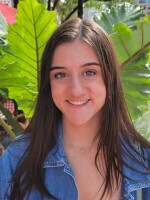This month, distinguished Kalamazoo poet Diane Seuss was awarded the Pulitzer Prize in Poetry for her latest book, frank: sonnets. The 66-year-old poet and Kalamazoo College professor emerita drew upon her life and the lived experiences of those around her to inspire her collection of sonnets. The book takes an archaic form you may have last encountered in high school English, tosses in a few household ingredients, and explodes it. Seuss uses the sonnet to tell a memoir in verse. She reflects on class, her struggles as a single mother, and her son’s battle with addiction. Stateside host April Baer sat down with Diane Seuss to hear more about her life and creative process.
April Baer: Even disaster is never far away, it feels like in these poems. Just in the very first one where you're talking about, you know, driving around in southwest Washington by Cape Disappointment, which is the point at which you had this revelation. You know, you talk about the fact that there have been people who took the opportunity of the view to end their lives. But it seems to be something that's on your mind through any number of other kinds of experiences, too. Could you say a little more about that?
Diane Seuss: Yeah, that was the first sonnet I came to. It was the first one I wrote. And I think at the time, I was feeling a degree of despair. You know, when you do a residency and you're separated from everything, you know, from your own landscape, your people, you're in the silence. Whenever I have done that, the first couple of days, I just cry. It's scary because you don't know what you're going to encounter in the work. And also, as you know, other things are going on. And I sort of hit that existential moment when I looked out at the lighthouse. And on the cliff over the sea. That seemed like a bottom line from which the book then needed to proceed. How do I explain this restless search for beauty or relief? And that really became the question of the book.
April Baer: It seems like a funny thing with residencies for writers or any artist. The assumption is that what writers need more than anything else is time and space and quiet. But some people draw really important things in their work from interacting with other people.
Diane Seuss: Yes. And I tend to be somebody who especially draws from solitude. It's just scary. I did a residency at a famous one out on the East Coast and in your cottage there are sort of placards with all of the people over the decades who have stayed in that little cottage. And, you know, you'll encounter James Baldwin, Louise Bogan, Tillie Olsen - a woman writer who had a big impact on me as a young writer. And so you feel often, surrounded by history, by ghosts. But even not on residency writing is scary business, at least the way I do it. I think poetry, maybe. Especially because you're, for me anyway, I'm always contacting those people I've lost and forces beyond. Everyday life. And that's intense and it's scary. And you have to sort of find the fortitude to do that. And it's not comfortable.
April Baer: Your son Dylan is a survivor of addiction. And you're pretty generous in explaining through these poems some of the truce that you came to, to help him get through to this next stage of his life was. Were there reasons why you felt it was important, either for your own process or for readers to get into detail about this stuff?
Diane Seuss: Oh, yeah. Well, you know, this is probably the area of my life that I felt most trepidation about entering, but I couldn't imagine leaving it a blindspot because it's so central to everything for both Dylan and me. Many of the poems are based on conversations that Dylan and I had over a year or so. And what I did basically was transcribe our written conversations and then find a way to compress them into 14 lines. And so one thing I'm doing with that is saying all things are equal. This has you know, this has as much import as “how do I love thee let me count the ways.” It's still a sonnet, it's still stuff, and it has dignity. There's so much shame attached to addiction, to being an addict, to being the parent of an addict. You know, I heard somebody say once, you know, you don't get casseroles delivered to your house when you have somebody struggling with addiction like you do for so many other things. That there's so much secrecy around it. And so I guess I wanted to not blow that up in a bombastic way, but like with the rest, as with the rest of my life, to tell the truth.






